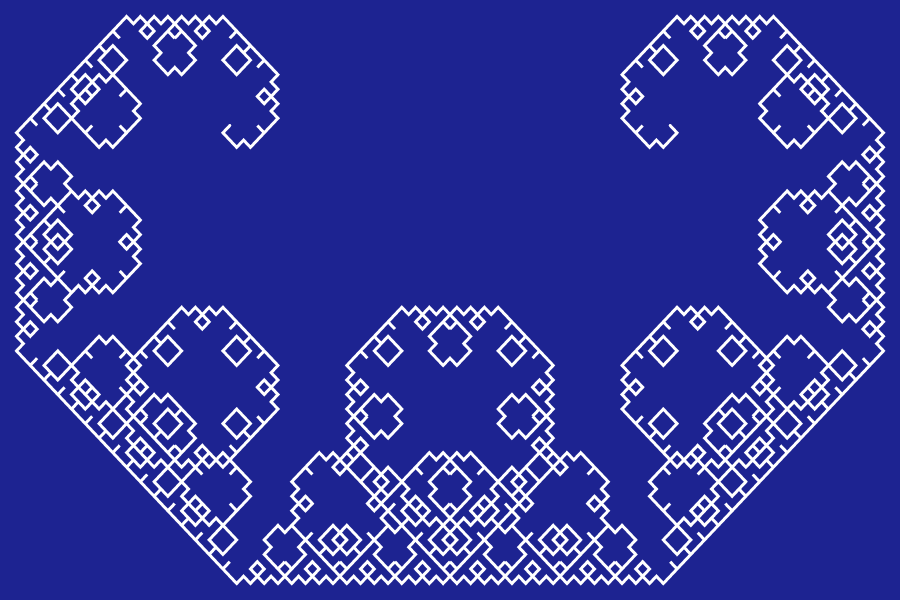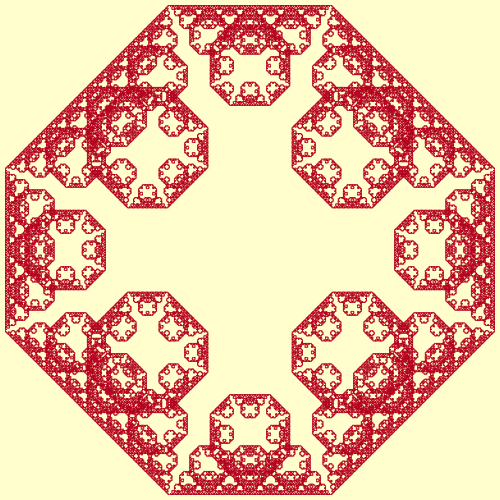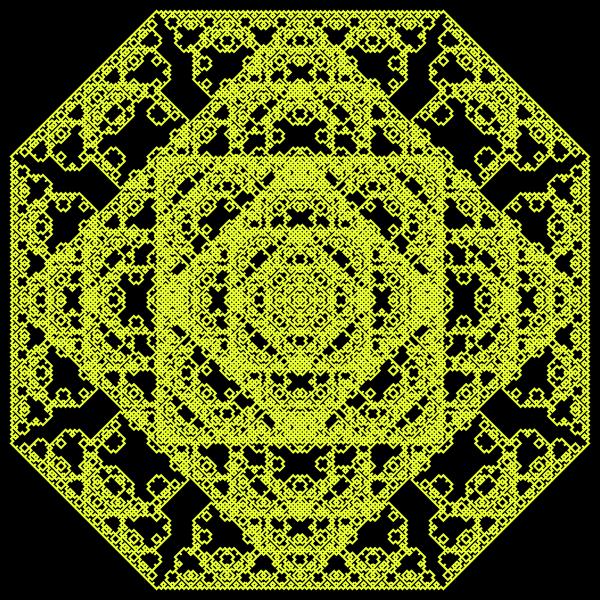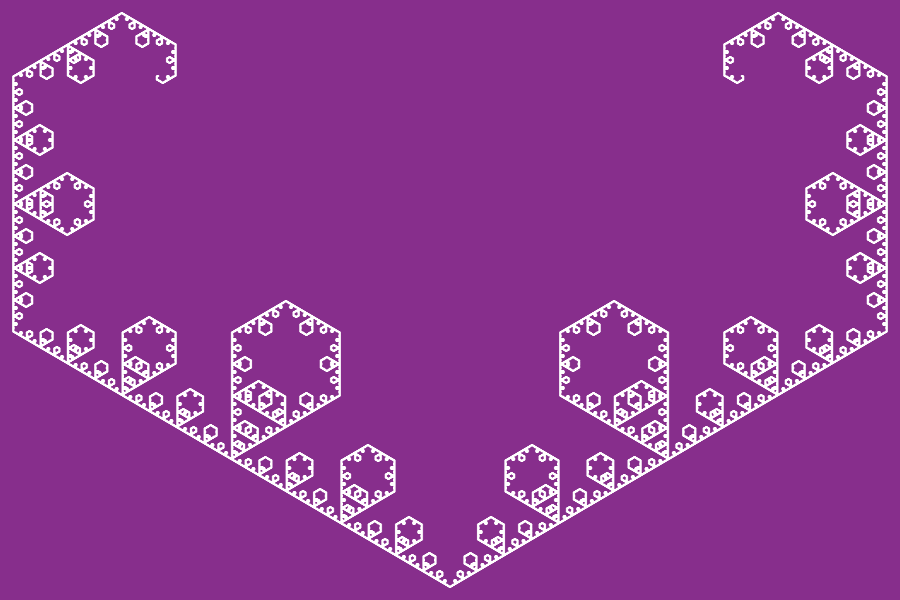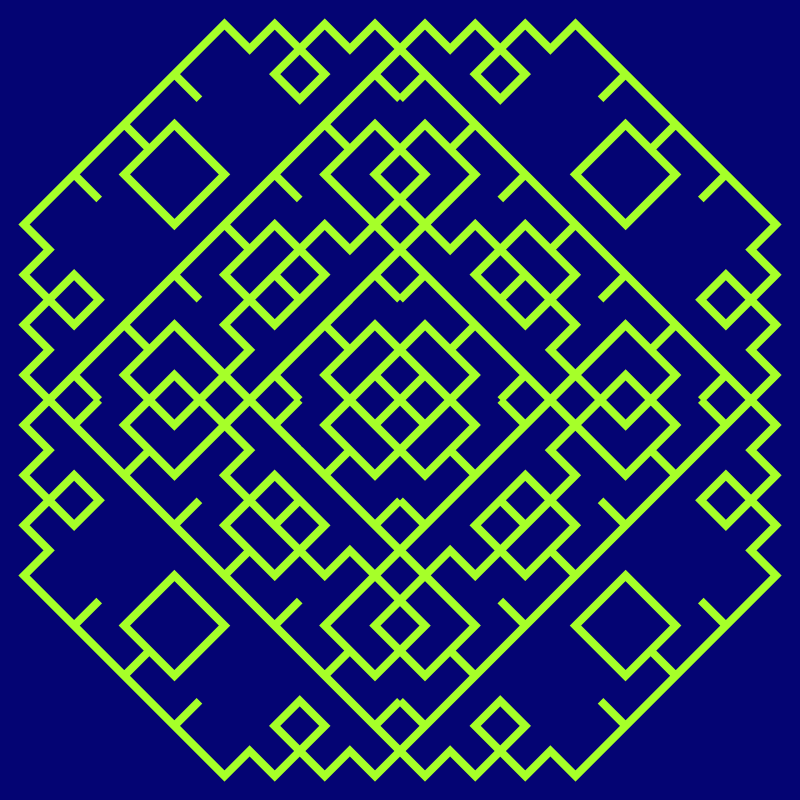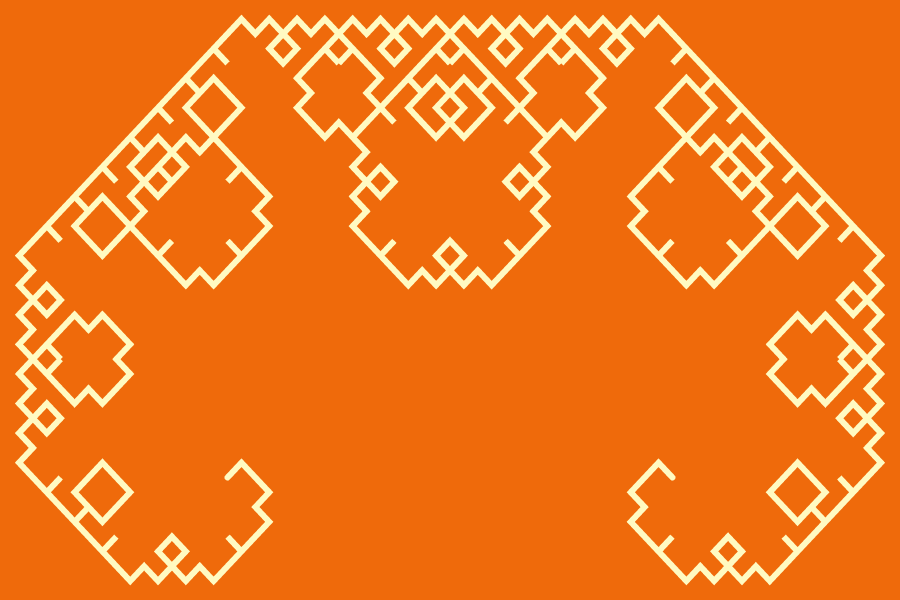This utility lets you draw colorful and custom Levy fractals. You can choose between four Levy fractal types (Levy dragon, two types of Levy tapestry and Levy diamond) and recursively iterate them for any number of times. You can customize the space for drawing, too. In particular, you can choose your own color for the canvas and adjust its height, width, and padding. You can also choose the fractals' spatial orientation and adjust the color and width for drawing the Levy curve. Fun fact – the Levy fractal consists of smaller Levy fractals that partially overlap each other. Created by fractal fans from team Browserling. Fractabulous!
This utility lets you draw colorful and custom Levy fractals. You can choose between four Levy fractal types (Levy dragon, two types of Levy tapestry and Levy diamond) and recursively iterate them for any number of times. You can customize the space for drawing, too. In particular, you can choose your own color for the canvas and adjust its height, width, and padding. You can also choose the fractals' spatial orientation and adjust the color and width for drawing the Levy curve. Fun fact – the Levy fractal consists of smaller Levy fractals that partially overlap each other. Created by fractal fans from team Browserling. Fractabulous!

This online browser-based tool allows you to create your own personal Levy fractals. The Levy fractal was first described by the Italian mathematician Ernesto Cesaro in 1906 and the German mathematician Georg Faber in 1910. However, it is named after the French mathematician Paul Levy, who was the first to describe its self-similar properties and estimate its Hausdorff dimension. Depending on the initial figure, there are four known types of the Levy fractal – Levy dragon, inside and outside Levy tapestry, and Levy diamond. The motif for the Levy dragon fractal is the two sides of an equilateral triangle and the basis is a unit line. At every next iteration, each line segment is replaced by the motif. The basis for the outside/inside Levy tapestry is a square and the motif is again the two sides of an equilateral triangle. To create the next iteration, the motifs are directed outside or inside of the square basis. The replacement figure for the Levy diamond is an isosceles trapezoid and the initial figure is a line. Each next iteration replaces every line in the fractal with the replacement figure. The Hausdorff dimension, which describes the complexity of the fractal for the Levy curve is almost the highest of all two-dimensional fractals and is very close to 2. That means this is one of the most chaotic and complex fractals there is. What's more, the interior of the Levy dragon consists of a countable number of components, the largest of which is a hexagon that is only a speck on the dragon. Mind blowing and ingenious at the same time, or as we love to say – fractabulous!
This online browser-based tool allows you to create your own personal Levy fractals. The Levy fractal was first described by the Italian mathematician Ernesto Cesaro in 1906 and the German mathematician Georg Faber in 1910. However, it is named after the French mathematician Paul Levy, who was the first to describe its self-similar properties and estimate its Hausdorff dimension. Depending on the initial figure, there are four known types of the Levy fractal – Levy dragon, inside and outside Levy tapestry, and Levy diamond. The motif for the Levy dragon fractal is the two sides of an equilateral triangle and the basis is a unit line. At every next iteration, each line segment is replaced by the motif. The basis for the outside/inside Levy tapestry is a square and the motif is again the two sides of an equilateral triangle. To create the next iteration, the motifs are directed outside or inside of the square basis. The replacement figure for the Levy diamond is an isosceles trapezoid and the initial figure is a line. Each next iteration replaces every line in the fractal with the replacement figure. The Hausdorff dimension, which describes the complexity of the fractal for the Levy curve is almost the highest of all two-dimensional fractals and is very close to 2. That means this is one of the most chaotic and complex fractals there is. What's more, the interior of the Levy dragon consists of a countable number of components, the largest of which is a hexagon that is only a speck on the dragon. Mind blowing and ingenious at the same time, or as we love to say – fractabulous!
In this example, we generate the regular Levy fractal (also known as Levy dragon) at its 12th iteration step. We draw the curve with a 3-pixel line on a rectangular canvas of size 900 by 600, with 15-pixel padding.
This example draws an outside Levy tapestry fractal. This fractal begins as a square but with increasing recursions, it becomes an octagon. We generate 15th recursive steps using 1-pixel thick, cream color line and we draw it on a Monza color square canvas.
In this example, we have selected the "Inside Levy Tapestry" fractal type and generate 14 stages for it. As you can see, the curves for this type overlap, which is rare in fractals. We use a 600- by 600-pixel space, filled with black color. For the Levy tapestry, we use a golden fizz color line with a thickness of 2 pixels.
In this example, we generate the Levy diamonds fractal, which is drawn from a 3-sided equal trapezium with a 30-degree angle at the base. We display 10 recursive steps of the Levy diamond curve on a vivid violet 900px-by-600px area.
In this example, we generate only 8 iterations of the Levy tapestry to clearly illustrate how the fractal evolves. We use an 8-pixel thick drawing pen so that all lines were well visible and draw them in contrasting colors (green-yellow color pen on a navy blue background.)
In this example, we invert the orientation of the Levy dragon fractal and turn it upside down. We use a Shalimar-yellow color line on a Christine-orange color background and show the 10th recursive stage.
You can pass options to this tool using their codes as query arguments and it will automatically compute output. To get the code of an option, just hover over its icon. Here's how to type it in your browser's address bar. Click to try!
Walk the Hilbert fractal and enumerate its coordinates.
Walk the Peano fractal and enumerate its coordinates.
Walk the Moore fractal and enumerate its coordinates.
Encode the Hilbert fractal as a string.
Encode the Peano fractal as a string.
Encode the Moore fractal as a string.
Encode the Cantor set as a string.
Encode the Heighway Dragon as a string.
Encode the Sierpinski fractal as a string.
Generate a Sierpinski tetrahedron (tetrix) fractal.
Generate a Cantor's cube fractal.
Generate a Sierpinski-Menger fractal.
Generate a Jerusalem cube fractal.
Generate a Jeaninne Mosely fractal.
Generate a Mandelbrot tree fractal.
Generate a Barnsley's tree fractal.
Generate a Barnsley's fern fractal.
Generate a binary tree fractal.
Generate a ternary tree fractal.
Generate a dragon tree fractal.
Generate a de Rham curve.
Generate a Takagi-Landsberg fractal curve.
Generate a Peano pentagon fractal curve.
Generate a tridendrite fractal curve.
Generate a Pentigree fractal curve.
Generate a lucky seven fractal curve.
Generate an Eisenstein fractions fractal curve.
Generate a Bagula double five fractal curve.
Generate a Julia fractal set.
Generate a Mandelbrot fractal set.
Generate a Mandelbulb fractal.
Generate a Mandelbox fractal.
Generate a Buddhabrot fractal.
Generate a Burning Ship fractal.
Generate a toothpick sequence fractal.
Generate an Ulam-Warburton fractal curve.
Generate an ASCII fractal.
Generate an ANSI fractal.
Generate a Unicode fractal.
Generate an emoji fractal.
Generate a braille code fractal.
Generate a fractal in audio form.
Create a fractal that looks like one but isn't a fractal.
Generate a fractal from any text.
Generate a fractal from a string.
Generate a fractal from a number.
Join any two fractals together.
Create a completely random fractal.
Set up an arbitrary IFS system and iterate it.
Recursively transform an image using IFS rules.
Run infinite compositions of analytic functions.
Create a surface that mimics a natural terrain.
Create a fractal surface via Brownian motion.
Apply fractal algorithms on your image and make it self-similar.
Find fractal patterns in any given image.
Find fractal patterns in any given text.
Find fractal patterns in any given number.
Tessellate a plane with fractals.
Run a cellular automaton with custom rules.
Play Conway's Game of Life on an infinite grid.
Subscribe to our updates. We'll let you know when we release new tools, features, and organize online workshops.
Enter your email here
We're Browserling — a friendly and fun cross-browser testing company powered by alien technology. At Browserling our mission is to make people's lives easier, so we created this collection of fractal tools. Our tools have the simplest user interface that doesn't require advanced computer skills and they are used by millions of people every month. Our fractal tools are actually powered by our web developer tools that we created over the last couple of years. Check them out!
